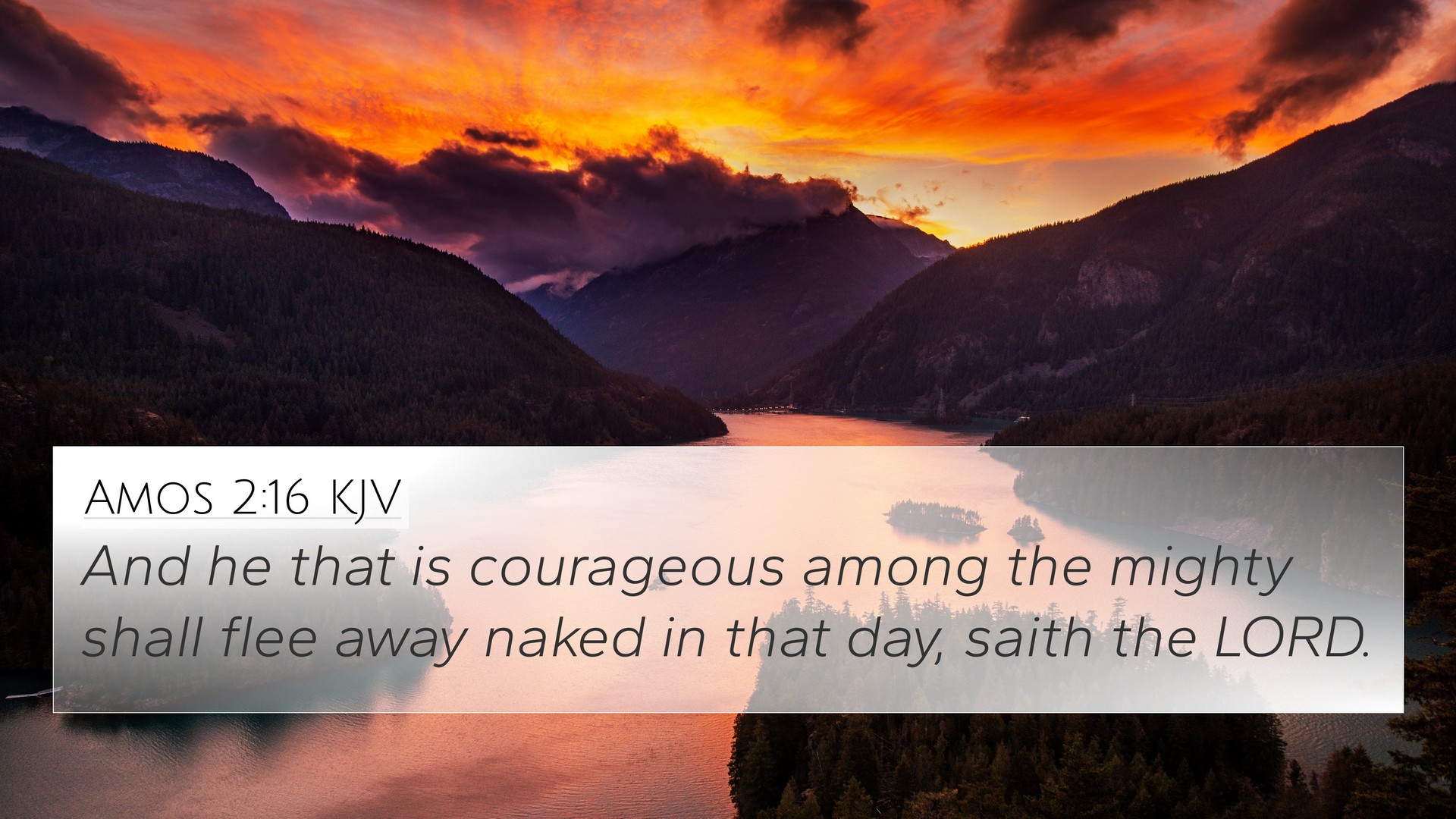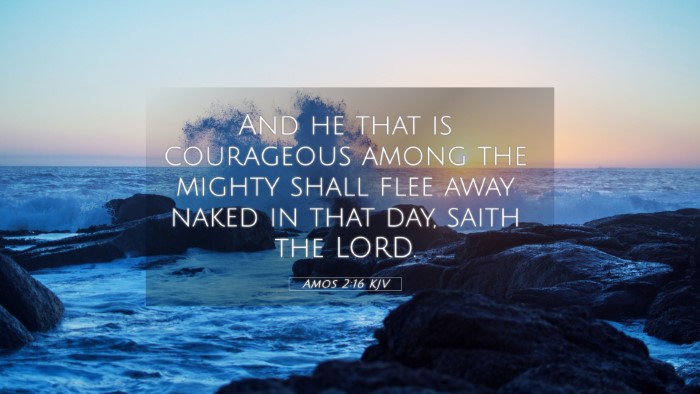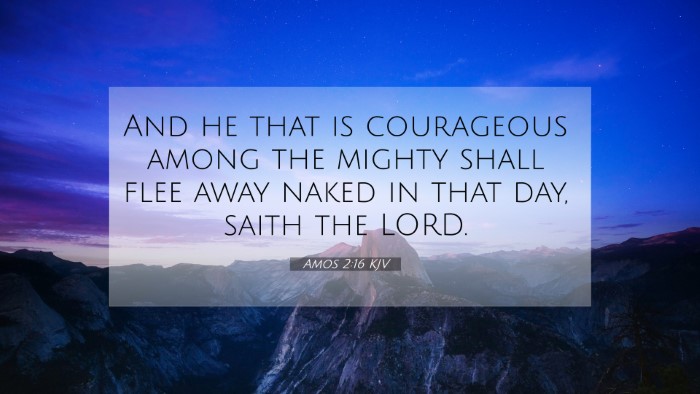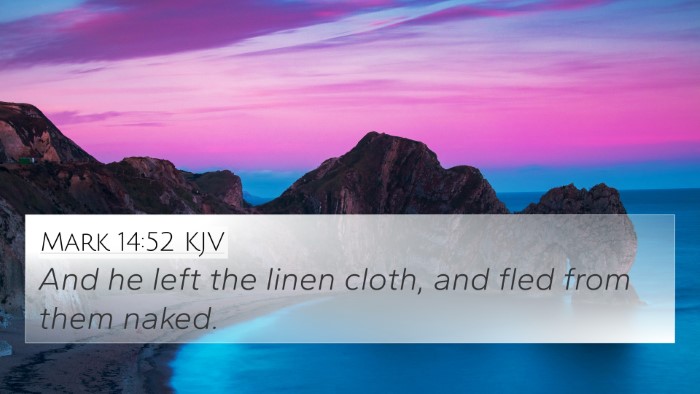Old Testament
Genesis Exodus Leviticus Numbers Deuteronomy Joshua Judges Ruth 1 Samuel 2 Samuel 1 Kings 2 Kings 1 Chronicles 2 Chronicles Ezra Nehemiah Esther Job Psalms Proverbs Ecclesiastes Song of Solomon Isaiah Jeremiah Lamentations Ezekiel Daniel Hosea Joel Amos Obadiah Jonah Micah Nahum Habakkuk Zephaniah Haggai Zechariah MalachiAmos 2:16 Similar Verses
Amos 2:16 Cross References
And he that is courageous among the mighty shall flee away naked in that day, saith the LORD.
Uncover the Rich Themes and Topics of This Bible Verse
Listed below are the Bible themes associated with Amos 2:16. We invite you to explore each theme to gain deeper insights into the Scriptures.
Amos 2:16 Cross Reference Verses
This section features a detailed cross-reference designed to enrich your understanding of the Scriptures. Below, you will find carefully selected verses that echo the themes and teachings related to Amos 2:16 KJV. Click on any image to explore detailed analyses of related Bible verses and uncover deeper theological insights.
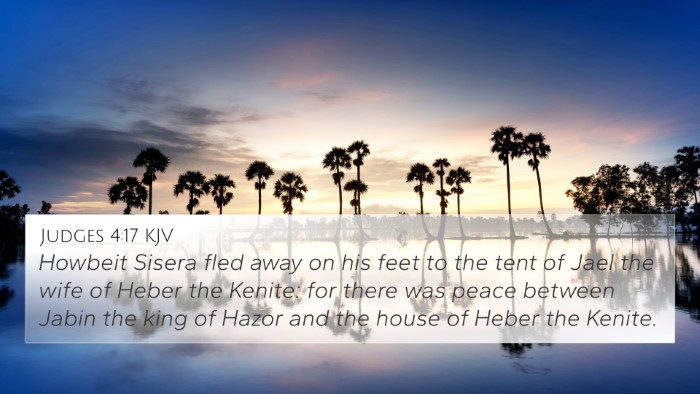
Judges 4:17 (KJV) »
Howbeit Sisera fled away on his feet to the tent of Jael the wife of Heber the Kenite: for there was peace between Jabin the king of Hazor and the house of Heber the Kenite.
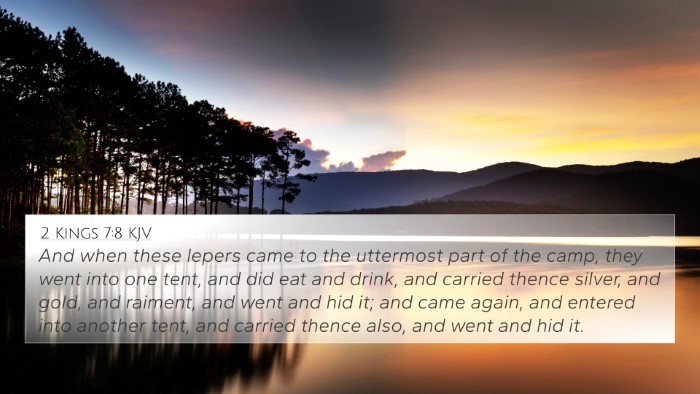
2 Kings 7:8 (KJV) »
And when these lepers came to the uttermost part of the camp, they went into one tent, and did eat and drink, and carried thence silver, and gold, and raiment, and went and hid it; and came again, and entered into another tent, and carried thence also, and went and hid it.
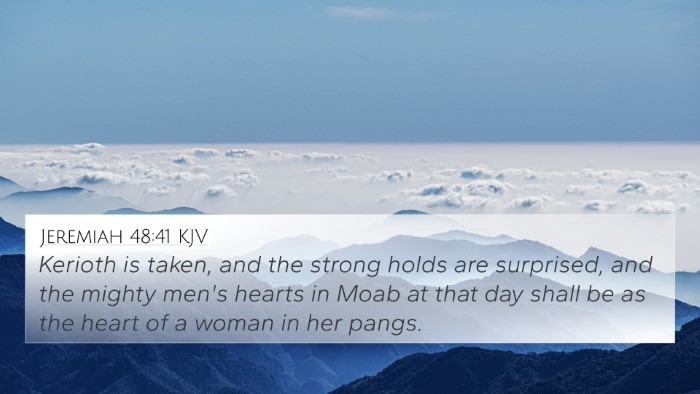
Jeremiah 48:41 (KJV) »
Kerioth is taken, and the strong holds are surprised, and the mighty men's hearts in Moab at that day shall be as the heart of a woman in her pangs.
Amos 2:16 Verse Analysis and Similar Verses
Understanding Amos 2:16
Amos 2:16 states: "And he that is courageous among the mighty shall flee away naked in that day, saith the Lord." This verse conveys a powerful message about judgment and vulnerability.
Summary of Interpretation
This scripture serves as a warning that even the mightiest warriors will not escape judgment. The idea of fleeing away naked symbolizes ultimate shame and defeat. Public domain commentaries provide a rich context to interpret this verse effectively.
Commentary Insights
-
Matthew Henry:
Henry emphasizes the futility of strength and courage in the face of God's judgment. He suggests that human efforts and supposed might mean nothing when God pronounces judgment. The metaphor of fleeing naked illustrates total loss and the exposure of one's true state before God.
-
Albert Barnes:
Barnes similarly points out that the strong will become the weakest when facing divine retribution. He notes that the word "mighty" here doesn't refer merely to physical strength but also to pride and arrogance in their possessions and status, leading to their shameful downfall.
-
Adam Clarke:
Clarke interprets this verse as a reflection on the inevitable judgment that falls on the unrepentant. The nakedness signifies exposure to judgment without defense. Clarke suggests this is a warning to all who trust in their strength rather than in God.
Thematic Connections
Amos 2:16 connects thematically with various scripture passages that discuss human pride, judgment, and divine retribution. Below are some cross-referenced verses that explore these themes:
- Isaiah 47:3: "Thy nakedness shall be uncovered, yea, thy shame shall be seen." This verse also uses the symbolism of nakedness to signify exposure, relating to the judgment of proud nations.
- Jeremiah 25:34-35: "Howl, ye shepherds, and cry; and wallow yourselves in the ashes, ye principal of the flock." This Danielic imagery aligns with Amos's themes of leaders facing shame in judgment.
- Job 31:8: "Then let me sow, and let another eat; yea, let my offspring be rooted out." This verse speaks to repercussions faced by those who ignore God's ways and justice.
- Romans 14:10: "For we shall all stand before the judgment seat of Christ." Here, Paul echoes Amos' sentiments about inevitable judgment regardless of earthly stature or might.
- Psalms 49:14: "Like sheep they are laid in the grave; death shall feed on them." This connects to the fleeting nature of earthly bravado faced with inevitable death and judgment.
- Lamentations 3:20: "My soul hath them still in remembrance, and is humbled in me." A connection is made to the humility before God when one confronts their vulnerabilities in light of divine judgment.
- 1 Peter 5:5: "Likewise, ye younger, submit yourselves unto the elder." This verse emphasizes humility and the importance of recognizing one's position under God's authority rather than one's perceived strength.
Conclusion
Amos 2:16 encapsulates a critical message about the futility of human strength compared to divine judgment. Utilizing tools for cross-referencing, readers can explore a network of scriptures that highlight inter-biblical dialogues on themes of judgment, pride, and vulnerability. Understanding these connections enhances the study of the Bible and provides a more profound insight into the intended messages behind the scriptures.
